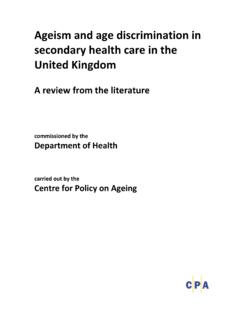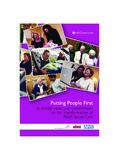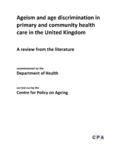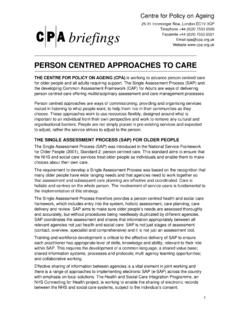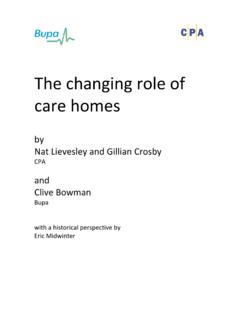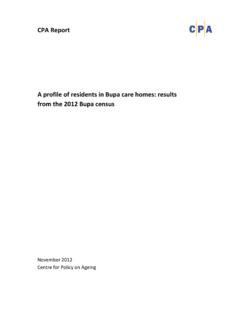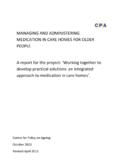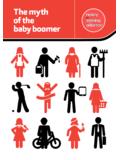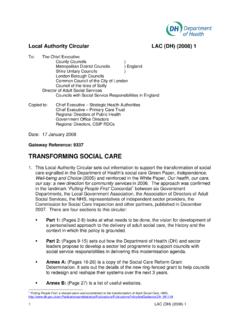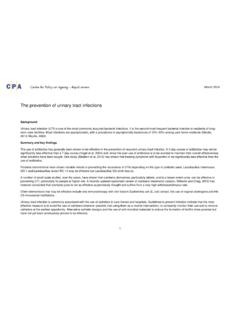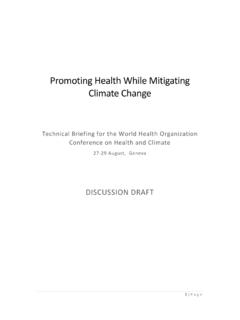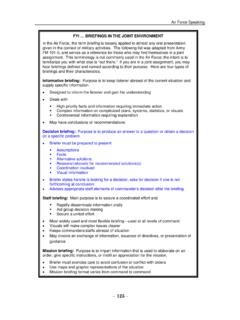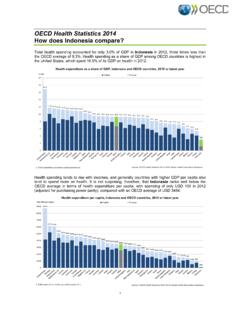Transcription of Briefing: The Health and Care of Older People in …
1 1 briefing : The Health and care of Older People in England 2015 Jill Mortimer and Marcus Green October 20152 Contents Introduction .. 3 Summary of key facts and figures in the report .. 4 1. The Health and care needs of our ageing population .. 10 Our growing Older 10 Life expectancy and disability free life expectancy (DFLE) .. 11 Health and care needs amongst Older People .. 13 2. The state of social care .. 24 Trends in publicly funded social care services .. 24 Implications of cuts to social care .. 26 Impact of cuts to social care on Older People .
2 29 3. The state of healthcare .. 33 Trends in NHS funding .. 33 Healthcare workforce .. 35 Trends in activity and demand within primary care and community Health .. 37 Trends in activity and demand within secondary care .. 38 4. A system under stress .. 43 Primary and community care services under strain .. 43 Stress in the acute sector .. 44 5. Conclusion .. 51 6. References .. 53 3 Introduction The purpose of this publication is to present the most authoritative and up to date facts and figures available concerning Older People s Health and care needs in England and how those needs are being met.
3 For the last few years Age UK has produced an annual briefing of this kind focused on social care . But in this age of integration both within Health and across Health and care it seems especially important to cover Health as well as care . Our intention is that this will be the model for all such Age UK reports from now on. Monitor, the Health service s financial regulator, has recently said that NHS providers, predominantly hospitals, overspent by 930m in three months, putting it on course for an annual deficit in 2015/16 of at least 2 billion, in what they described in unusually frank language as its worst financial crisis in a generation.
4 Meanwhile, report after report expresses concern about the lack of social care available to Older People , as well as about the fragility of the social care market and the poor quality of what is often on offer. This publication looks beyond the headlines and tells a different side of the story, looking at issues like costs and activity through the prism of what Older People need from the NHS and from social care in order to thrive. In reviewing all the trends and statistics we have been acutely conscious that the vast majority of Older People in this country are spirited and resilient and want to live life on their own terms, preferably in their own homes, for as long as they possibly can.
5 Our Health and care system has a crucial role to play in enabling this to happen and our intention is that this briefing will shed some light on how well it is performing in this respect, which matters so much to Older People . During the summer of 2015 Age UK commissioned BritainThinks to carry out some focus groups with Older People about what they wanted from the NHS and social care . This exercise showed once again that the vast majority of Older People greatly value the NHS and are grateful to the People who work in it for the help they receive. The focus groups also brought home to us though how concerns about their Health are often very near the surface for Older People .
6 Participants living with multiple long-term conditions were acutely aware that a minor Health problem might turn into something more serious quite quickly, causing them pain and distress if it was not recognised and treated with reasonable haste. They therefore looked to the NHS to perform this role and, understandably, they wanted the NHS to be there for them, standing with them, when they needed it. Being able to keep going if they developed what would be regarded by professionals as a social care need was important to the research participants too, even though most of them did not realise that social care provision is not part of the NHS.
7 Those who already had some experience of the social care system, for example as a result of caring for a loved one, had some worries about the capacity of the system to help them if and when the time came when they too needed support. On the whole the participants were happy with the Health services they were receiving, but worries were expressed by some about having to wait too long to see their GP, about insufficient support in managing different medications, and about lack of continuity in staffing at primary care level. They valued having a strong relationship with the main Health professionals in their lives, especially if they had long-term conditions and complex needs 4 which necessitated frequent discussion, but for a new Health complaint that might be something to worry about what mattered most was seeing a Health professional fast.
8 Their perspectives were a salutary reminder that it is not just what our Health and care system does to help Older People that matters: how it does it and the confidence that it manages to instil in them in the process also play a big part in enabling us all to keep strong and make the most of our later lives, come what may. Summary of key facts and figures in the report Introduction Our growing Older population The population is ageing, which means we are living longer and there are more Older People as a proportion of us all; between 2005/06 and 2014/15 the number of People aged 65 or over in England increased by almost a fifth and the number aged 85 and over rose by approaching a third.
9 The increase in the Older population is projected to accelerate over the next twenty years. Older age groups are more likely to have Health conditions, many of which are preventable and most of which are manageable Disability-free life expectancy is rising more slowly than life expectancy the length of time we are likely to live - meaning that People are living for more years with disabilities. There are big inequalities both in terms of how long we are likely to live (life expectancy) and in how well People are likely to be in Older age (disability-free life expectancy), mirroring broader social and economic trends.
10 Most People aged 75 and over have one or more Health conditions, but 50 per cent of them do not consider themselves to be living with a life limiting long-term condition, meaning that even if they have one or more Health conditions they do not feel it has a significant impact on their lives. 1 in 10 of People age 65 and over are frail , rising to one in four of those aged 85 and over. Most long-term conditions are more prevalent among Older age groups; for example, the prevalence of diabetes rises steadily among men and women until their early eighties, peaking at 22 per cent for men and 17 per cent for women.
